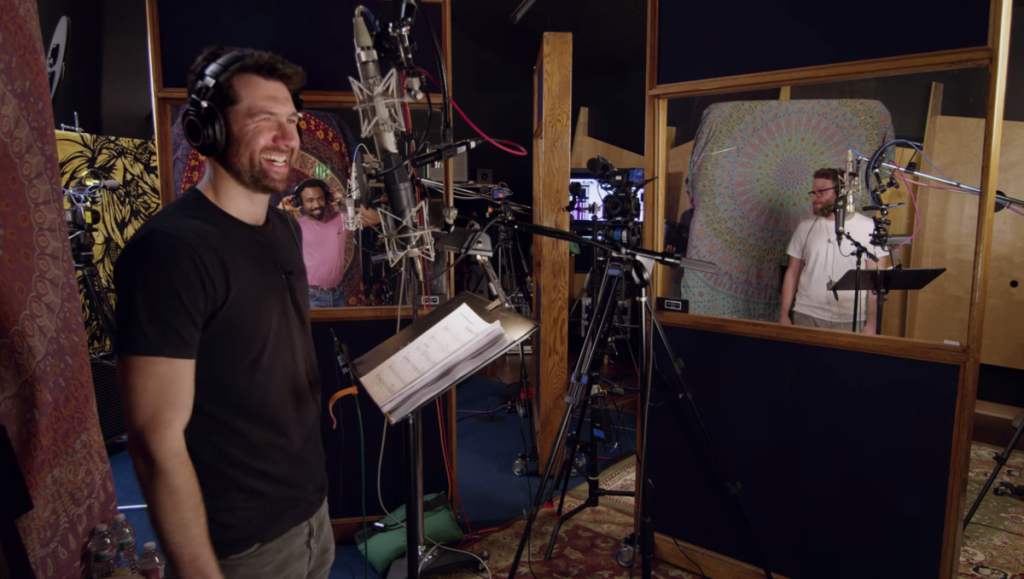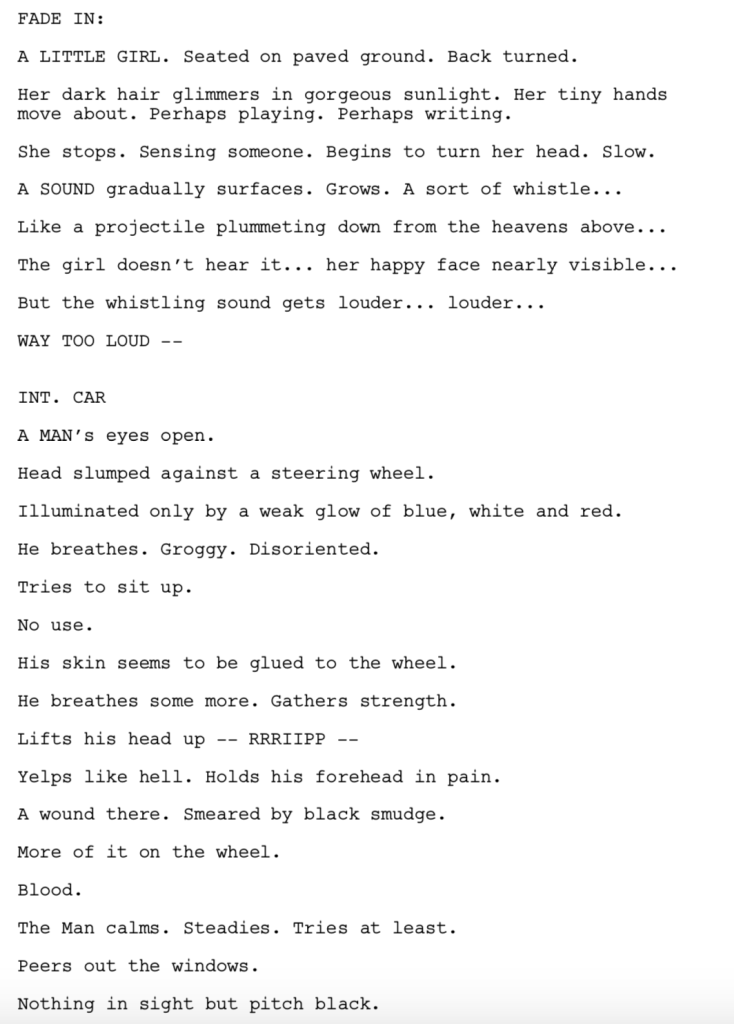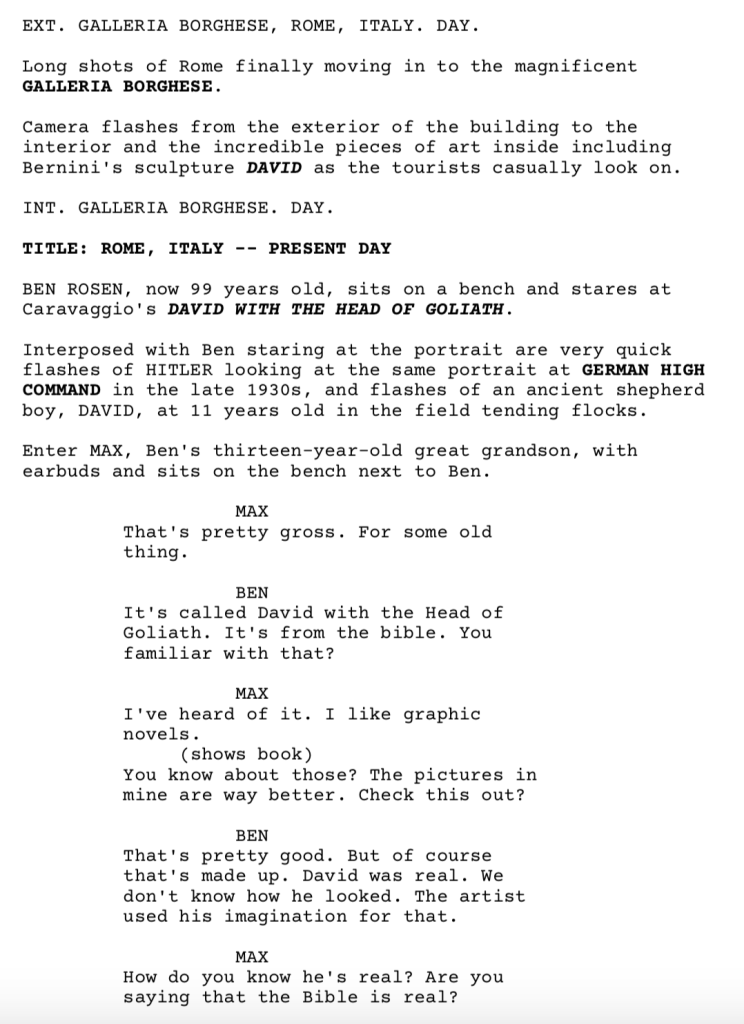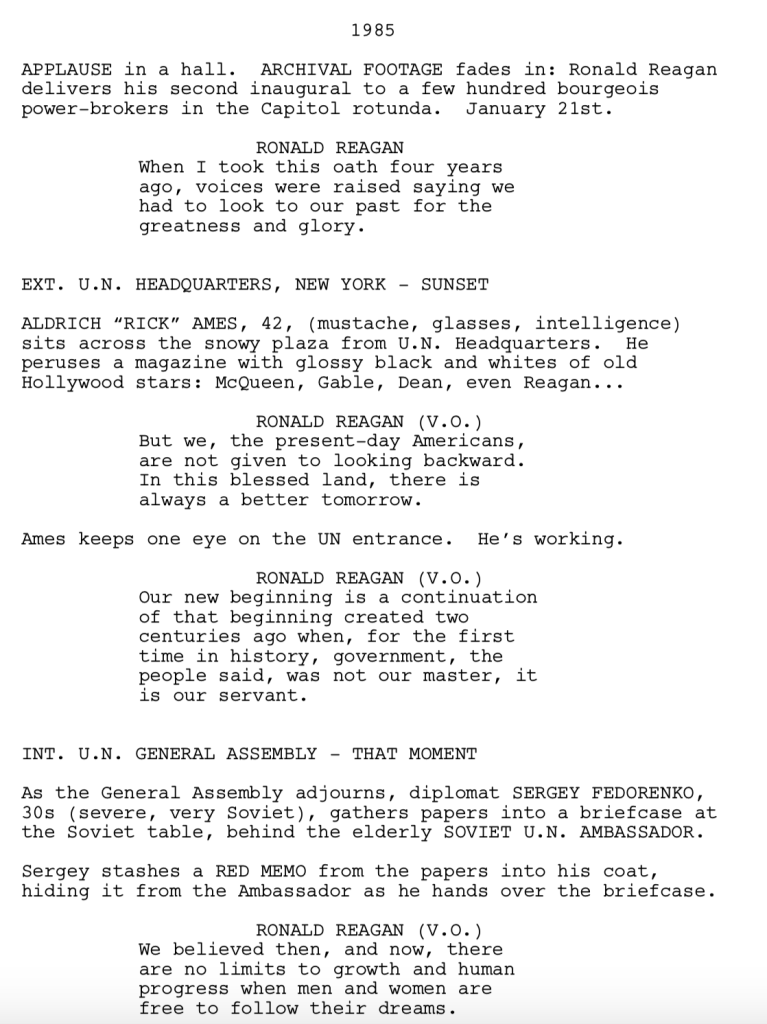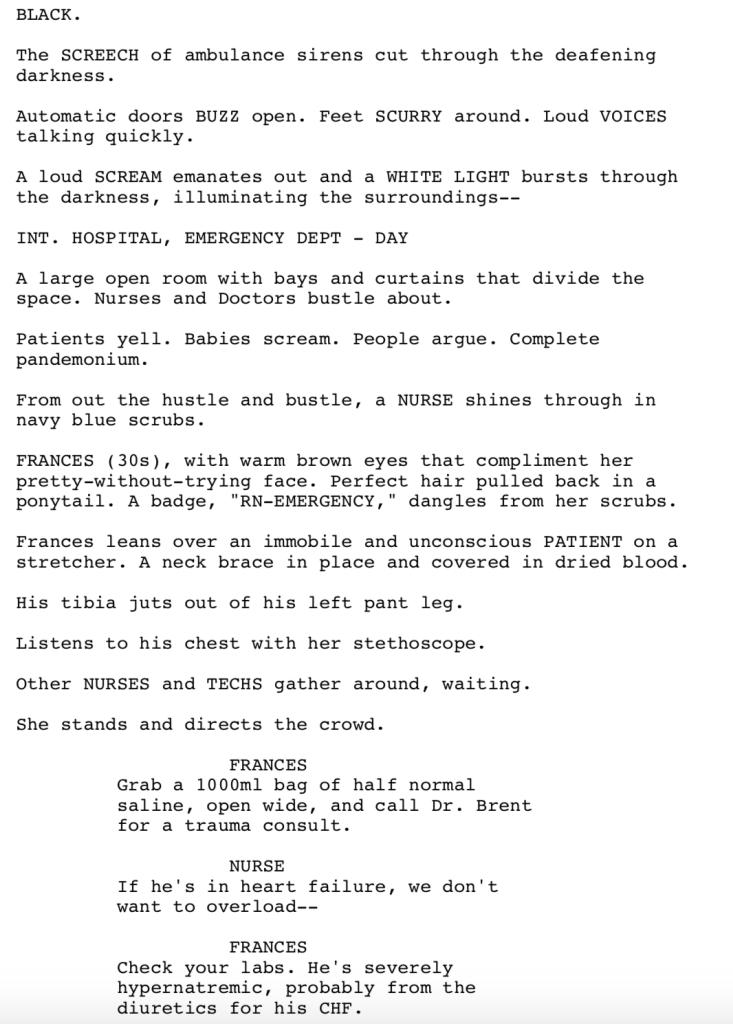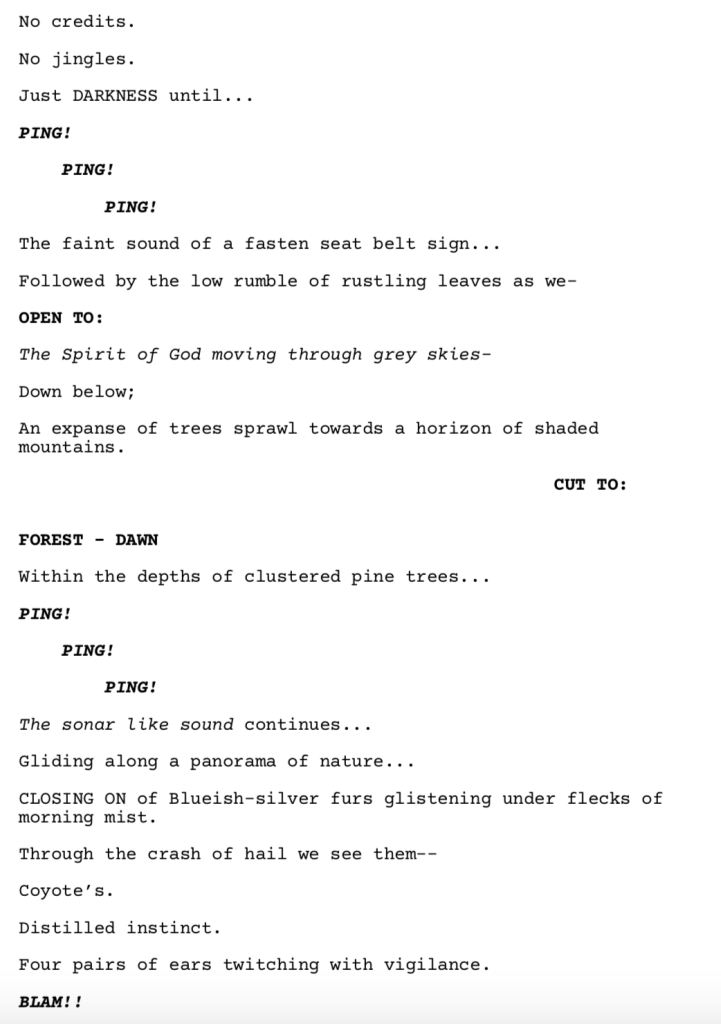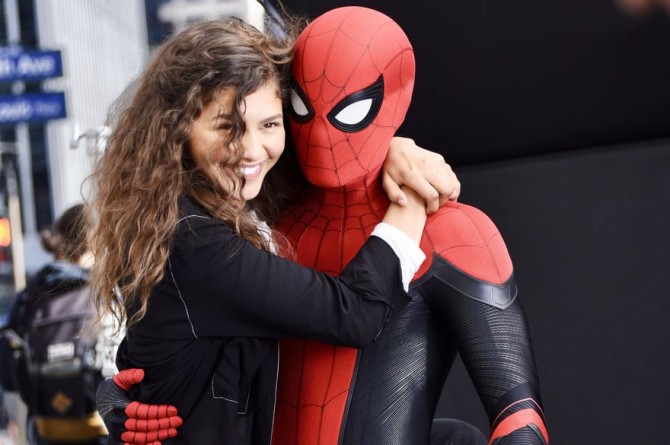Genre: Contained Thriller
Premise: (from Hit List) A happily married couple’s anniversary celebration goes awry when they find themselves victims of a sinister home invasion.
About: Platinum Dunes has been one of the only companies paying the bills over at Paramount. Last year they bought this project from Holly Brix. Brix has been fighting her way up the ladder all decade. Coming off of writing on The Vampire Diaries, she’s worked on a number of assignments of projects in development.
Writer: Holly Brix
Details: 98 pages
Talk about your blast from the past. I first reviewed a script from Brix (titled “The Ark”) eight years ago! It’s good to see she’s still spec’ing it up. Most writers who get through the golden Hollywood arches chase them assignment dollars. So to see some writers still betting on themselves is inspiring. But this latest script from Brix wasn’t entirely uncalculated. She knew that if she was going to sell something, it needed to be a genre that studios actually buy. And thus she went with one of the most dependable sub-genres out there: the home invasion thriller.
Once a staple of Hollywood cinema, these thrillers are making a comeback thanks to Netflix’s algorithm anointing them profit-worthy. I mean, if they approved that abomination of a movie, Secret Obsession, they’re probably chomping at the bit to produce a script that actually makes sense. Does Happy Anniversary make sense? Let’s find out!
[IT’S IMPOSSIBLE TO DISCUSS THIS SCRIPT WITHOUT DISCUSSING ALL ITS SPOILERS. I RECOMMEND YOU READ IT YOURSELF FIRST TO GET THE INTENDED EXPERIENCE]
42 year old Brett Hardwick, the producer of a Bachelor-like show called “The Groom,” is celebrating his 11th anniversary with his mildly successful actress wife, Michelle. The two seem smitten with each other. And after they eat at one of the nicest restaurants in Los Angeles, they head back to their mansion in Malibu.
However, after they fall asleep, a man in a mask appears above their bed. He wakes Michelle up and tells her to zip-tie her husband’s hands together. Uh-oh. He tells both of them that he’s going to rob them. However, when he goes into the house to do the job, Brett is able to escape and confront the man.
Michelle barely overhears their conversation, where she learns that Brett and the man, Esperanza, are actually working together. Brett wants to kill his wife for the insurance money as he’s having money problems. Originally, Esperanza wasn’t supposed to know this. He was only here so Brett could prove that a man broke in. Now that murder’s involved, Esperanza is having second thoughts.
He ties up Brett then goes back to Michelle and sees if he can make a side deal with her. Esperanza is an actor and would love to be the new “Groom.” Michelle tells him she can make it happen. But then Brett comes back in the picture and Esperanza shoves them in a locked closet as he tries to figure out his next move. Michelle, who now knows her husband plans to kill her, must pretend that they’re on the same team in order to get out of here asap.
Eventually, the two get out and Michelle gets her hands on a gun. A big confrontation occurs between the three as everyone demands that they all come clean, which ends (MAJOR SPOILER) in Michelle shooting and killing Esperanza, after which, she high-fives Brett, and we learn this was all just a big anniversery gift. That Michelle got to kill someone. Or was it? We then flash back to Esperanza’s side of the story, where we learn there’s still one last problem the couple will need to take care of.
Whenever I finish a script I’m going to review, the first question I ask is, “Is there anything unique to talk about here?”
Usually, the answer is no because everybody keeps writing the same stuff. And, honestly, when I saw this premise, I was sure it was going to be more of the same.
But Happy Anniversary is different. I’m not going to say it’s entirely original. But it’s got enough uniqueness that we actually have something to talk about today.
The script is quite layered in that every 20 pages, we get some new information that makes us see the story through new eyes. At first it’s Brett plans to kill his wife. Then it’s Michelle plans to work with Esperanza. Then it’s Brett and his wife working together under possible false pretenses (neither can 100% trust the other). The conversations the characters have become complex, to the point where after you hear what everyone says in a scene, you stop and try to figure out what they really meant. Were they lying? Were they telling the truth? Who’s allies with who now? It was fun.
The script also nailed its “But what it’s really about” component. A “But what it’s really about” can turn a standard premise into something riveting. This movie doesn’t work if it’s just a married couple unlucky enough to have a home invasion on the night of their anniversary. It works because what it’s really about is their marriage and is it as strong as they’ve presented it to be? There’s a ton of irony in that question.
Just a reminder, “But what it’s really about” is the character story you’re telling within your movie. “Titanic” is about being on the most infamous doomed ship in history. But what it’s really about is the influential people we meet throughout our lives that help us see the world in ways that change our lives for the better. It’s that universal human experience component that everyone can understand and relate to. But it’s even better when it’s tied to your concept, which it is in Happy Anniversary.
Another thing I noticed was that Esperanza felt more complex than your average bad guy. He wasn’t just bad to be bad. He had issues with killing. He had fame aspirations. He had morals about what he would and wouldn’t do. Then money enters the equation and that line of morality starts shifting. I wasn’t sure what was coming next from this guy. And that impressed me.
Then, late in the script, there’s this surprise chapter where we flash back and meet Esperanza before all this goes down. We get to know him better and what his perspective was going into the night. Whenever you’re forced to see the world through a character’s eyes, that character takes on a whole new life. They’re going to have more going on because you don’t see them as a secondary object that’s written to react to your hero. You see them as their own hero. In their own story.
And so all of a sudden, his complexity made sense. Once Brix had to get into this character’s head to write this late “get to know Esperanza” chapter, he became more complex, a primary character as opposed to a secondary one. So the lesson here is, you won’t always write a script like this where we’ll see the story through the “villain’s” eyes. But you can still write out a big backstory separate from the script that will help you find that same complexity that Brix found here.
As much fun as this script is to discuss, it’s not perfect. When you create this many layers, this many characters deceiving each other, it’s almost impossible to write from a place of truth. For example, early on, we’re with Michelle as she’s secretly listening to Brett and Esperanza talk about murdering her. Now, eventually, we’ll learn that Brett and Michelle were working together the whole time. Which means that when we were watching Michelle in that moment, we weren’t watching her fear that conversation like we thought, we were watching her listen to a script they had already drawn up with one another. So there’s a lot of cheating that goes on with these scripts and it makes for a lot of, “Well wait a minute, then what about…” questions when the credits roll.
Alfred Hitchcock used to say that you only needed to trick the audience for as long as it took to leave the theater. It didn’t matter if things didn’t make sense after that. But you can’t do that these days. Movies are dissected incessantly and become retroactive failures if enough people point out their inconsistencies. Not everything adds up here. But it’s entertaining enough to recommend. And I can see why Platinum Dunes grabbed it. It’s a fun script.
[ ] What the hell did I just read?
[ ] wasn’t for me
[x] worth the read
[ ] impressive
[ ] genius
What I learned: Chapters. Brix uses chapters here, of which there are four (or maybe five). The nice thing about chapters is you can create your own structure with them. You can move away from the classic three-act structure and create your own checkpoints. There’s something about knowing we’re inside of a chapter that makes us feel like the writer has a plan. So we’re not freaking out when the script doesn’t follow the traditional movie formula.
What I learned 2: Get your thrillers and horror scripts to Platinum Dunes. They love original specs in these genres!
Genre: Live Action Animation (is that a thing?)
Premise: (from IMDB) After the murder of his father, a young lion prince flees his kingdom only to learn the true meaning of responsibility and bravery.
About: The Lion King is the new king of the Disney Live Animation Remakes as it raked in 185 million dollars over its first weekend (Beauty and the Beast is second with 174 million). Jon Favreau directed this photo-realistic remake which stars Donald Glover, Beyonce, James Earl Jones, Seth Rogen, and Billy Eichner.
Writer: Jeff Nathanson (story by Brenda Chapman – characters by Irene Mecchi, Jonathan Roberts, and Linda Woolverton).
Details: 1 hour and 58 minutes long
So the new Lion King movie isn’t getting the best reviews. And I’m saying to myself, whykunna matata? The CGI real-life animation looks flawless. The trailers make the movie look beautiful. They sent out a clip of the famous opening of the film ahead of time, which turned out to be a shot-for-shot remake. That tells me Favreau isn’t going to mess with the story. The Seth Rogen Billy Eichner casting of Pumbaa and Timon is beyond inspired. Every behind-the-scenes clip of them working is great. So what’s going on here?
I think I know.
The Lion King is like the Star Wars of animated films. It’s not only a perfect movie. But it’s a movie that people hold so dearly to their heart, they can’t see it any other way than how it was. Remaking the film “live action,” is like stepping on an entire generation’s dreams.
However, I was never a huge Lion King guy. Don’t get me wrong. I liked it. But I only saw it one time 20 years ago. So I hold no biases or preconceived notions about how things are supposed to be. Honestly, the only moment I truly remember was that opening. So I’m not going to be angrily pointing out that Pumbaa and Timon were in a waterfall during the original performance of Hakuna Matata, and now they’re in a field.
What I’m most excited about with this film is to finally watch it through screenwriting eyes. Because when I originally saw it, I didn’t know anything about screenwriting. So all of that manipulation the screenwriter did to me to make me enjoy his story – I was finally going to figure out how he did it. Cause let’s face it – this is one of the greatest cinematic meals ever served and it will be great to finally find out what was in the recipe.
I’m assuming you know the story of The Lion King. But in order to properly discuss the screenplay, here are the highlights. 2019’s Lion King starts with baby Simba lion being announced as the next king. This makes Scar, the brother of current lion king, Mufasa, angry, as it means he’ll never inherit the throne. Unless, of course, he kills both Mufasa and Simba.
He manages to kill Mufasa, but Simba is more elusive, running far away and eventually meeting up with warthog, Pumbaa and meekrat, Timon. These two only care about the here and now. They just want to have fun. And they teach Simba to do just that. Cut to several years later and Simba is all grown up, none the wiser that back home, Scar has employed a group of rabid hyenas to rule the land, which has been decimated under his reign.
Eventually, Simba’s childhood friend, Nala, escapes the clutches of that reign, heads out into the countryside, and finds Simba, who she’s shocked is still alive. She explains to Simba how terrible things are back at the kingdom, and asks him to come back and take his rightful throne. After living a totally chill-out lifestyle for the last few years, though, Simba doesn’t think he has it in him to defeat Scar. But Nala eventually convinces him it’s his duty and off they go.
This was an oddly structured screenplay.
It had an enormous first act. At least it felt it like it did. There’s a downside to long first acts and there’s an upside. The downside is that it can feel like the story isn’t getting started. Which leads readers and audiences to become impatient. They want to reach that second act starting point where the hero goes off on their adventure.
The upside is that you spend more time getting to know the characters. The more the audience knows the characters, the more they’ll care, and the more invested they’ll be throughout the second and third acts.
My guess is a couple of things happened here. Jon Favreau loves long first acts. He’s said as much in interviews. Also, you don’t need to worry about keeping a reader invested early on with a script like this. The first time people see the story will be in theaters (not on paper). By then, you already have them. I mean, who’s going to walk out 20 minutes into a movie after they’ve paid 70 bucks for their family to be there? So long first acts are something you don’t really need to worry about in this situation.
The biggest surprise about The Lion King was the light second act. The second act is supposed to be the act of struggle, of conflict. But Simba doesn’t experience any of that in The Lion King. He’s just sort of hanging out with his buddies, singing and having fun. It’s a very relaxed life for Simba, which is the opposite of what usually happens in a movie. For example, when Anna goes after Elsa in Frozen, she encounters all sorts of obstacles trying to get her and bring her back home.
So I wondered how they were doing that and keeping the movie entertaining. I realized they did it in two ways. The first was they would occasionally cut back to Scar’s rule and show how bad it was getting. At one point he tells Sarabi, Mufasa’s widow, that if she doesn’t marry him, the hyenas will eat before the lions. So now all the lions are starving. This keeps some level of conflict in the movie, even if it’s away from the main character.
The other way is through music. And this is where things can get confusing for screenwriters because they can rightfully argue that the main character isn’t doing much throughout the second act. He’s very inactive. And, hey Mr. Professor Screenwriter Man, didn’t you tell us that our main characters needed to be active for a script to be good?
Well, here’s the thing. Everything goes out the window when a movie has a “BEST EVER” of something. You can argue that there’s zero story in When Harry Met Sally. It’s just a bunch of static scenes of people talking. Well, yeah, but it contains THE BEST EVER ROMANTIC COMEDY DIALOGUE in movie history. When you have a “best ever” in a film, all that film’s weaknesses can be overlooked because we don’t see them. And Lion King has the best ever music in an animated film. So even though Simba and his pals aren’t doing much, we’re getting these iconic musical numbers to sing along to. So we don’t notice it as much as we would in a non-musical movie.
I will say this. By making the first act so long, it ensured that the second act would be shorter. Therefore, the lack of conflict in the second act wasn’t as pronounced as it would have been had the act been twenty minutes longer.
Another thing I wanted to bring up was plot point paradoxes because there are times in a script when you get to these plot points where you have two opposing forces working against each other and you basically have to fudge the plot to move forward.
This occurs in The Lion King after Mufasa’s death when Scar approaches Simba. This is a much trickier moment than the casual viewer realizes. Simba has to live for the story to go on. But Scar would 100% kill him. We’ve already established he’ll kill his bloodline to get the throne. So if we’re talking about reality and character consistency here, Scar would slaughter Simba right now.
But then there’s no movie. That’s the paradox. So what do you do? You have to fudge it. So what Scar says to Simba is “run away and never come back.” Then, the second Simba starts running, Scar tells the hyenas to “kill him.” This is your fence-straddling moment. It allows Simba to get away so the story can continue, and it keeps your character consistent since Scar “technically” tried to kill him.
I liked 2019’s The Lion King. It didn’t capture the magic of the first film. However, of the Disney live animation remakes, this is definitely my favorite.
[ ] What the hell did I just watch?
[ ] wasn’t for me
[xx] worth the price of admission
[ ] impressive
[ ] genius
What I learned: The first act can be thought of as the “getting to know everybody who will be in this story” act. It’s where you set everyone up. As long as you keep all of these character set-ups entertaining, you can theoretically stretch the first act out as long as you want. The Lion King 2019 incorporates a “Mini-journey” in its first act to ensure it stays entertaining. In it, Simba and Nala go explore a graveyard, where they encounter a pack of hungry hyenas. We’re setting up the characters AND we’re being entertained. If you make the mistake of only doing the first one (the setting up part) expect the reader to get bored quickly!
Just a friendly reminder to anyone submitting a script for Amateur Friday. I recognize that this is a nice opportunity to get feedback for scripts that are works in progress. But I’m letting you know now that any pitch along the lines of, “I’m not really sure about this script. I’m hoping to see what people think” isn’t going to get chosen. This is the only place on the internet where random strangers willingly read amateur screenplays. So I’d prefer to put the best stuff up here I can find. There’s no hard and fast rule to this. If you send one of these e-mails and include a Jurassic Park level logline, then yeah, I might post it. But, generally speaking, I won’t. The scripts that win Amateur Showdown tend to be scripts that the writers have put a ton of work into. So you’re gonna want to bring your best anyway.
Oh, and I have one minor requirement for readers participating in this weekend’s festivities. Before reading any of the scripts, you must first perform The Git Up Challenge. Preferably with the shades up so that your neighbors can see you.
If you haven’t played Amateur Showdown before, it’s a cut throat single weekend screenplay tournament where the scripts have been vetted from a pile of hundreds to be featured here, for your entertainment. It’s up to you to read as much of each script as you can, then vote for your favorite in the comments section. Whoever receives the most votes by Sunday 11:59pm Pacific Time gets a review next Friday. If you’d like to submit your own script to compete in a future Amateur Showdown, send a PDF of your script to carsonreeves3@gmail.com with the title, genre, logline, and why you think your script should get a shot.
Title: The Above
Genre: Contained Thriller
Logline: Awaking on an unknown flight to find everyone else unconscious, a dazed baggage-handler must uncover his foggy past and save the plane before it falls from the sky.
Why You Should Read: Contained thrillers still today seem to remain one of the best ways to sell a spec. One possible issue with them is that they sometimes can feel like they’re stuck in place (which they usually are). Here’s my try at avoiding that issue by using a contained location that’s moving at the speed of hundreds of miles per hour. I went back to see Carson’s reviews on earlier contained material and tried my best to incorporate all the best parts of them, from clear GSU to steadily unfolding mystery. Very interested to hear everyone’s thoughts!
Title: The Final Solution(s)
Genre: Historical Fiction/Science Fiction
Logline: A centenarian recounts to his great grandson how he was secretly recruited as a WWII soldier to be transported to biblical times to counter Hitler’s plot to destroy a fledgling Jewish nation.
Why You Should Read: My day job is as real as it gets; I’m an urban public defender. I employ the persuasive power of words to desperate situations, often for societies’ outcasts. And while I feel generally fulfilled by my calling to serve the voiceless, the law is not my first love. Books and movies occupy that place. Fiction and philosophy are my particular favorites, but I partake in all levels of discourse, from Cable News to Cardi B, Stephen Hawking to Steven Soderbergh, James Fenimore Cooper to Jim Rockford. Currently, I am trying to discover how a late-forties father of two with a second marriage and two more step kids, nagging yoga injuries, an inflated mortgage, a stressful career and all the other normal trappings of middle-class American life can become a Dharma Bum. I doubt I’m the only one seeking that answer, but perhaps I’m the only one framing the question quite like that.
Everything I write at this point in my life strives to highlight the primordial human yearning for peace and love set against the grit and contradictions of our post-everything world. The attached screenplay reflects my personal appreciation for art and science as well as history and fiction. Hopefully it reflects my deepest belief about all art, namely, that art should seek simultaneously to entertain and to educate, to touch both intellectually and emotionally, and, most of all, should serve to nurture each of us to find our best, our most complete selves. If nothing else, this script represents the uniqueness of me, my life experiences and worldview, and in that way will be unlike anything else you have ever read. I can think of no other work in literature or the movies that weaves history, fiction and the bible together in such a cohesive and plausible manner. And yet, in the end, it is the relationship of storyteller to listener, ancient mariner to wedding guest, that forms the emotional center of the work and delivers the simple moral truth that drives this story forward.
Title: YEAR OF THE SPY
Genre: Spy, True Story, Thriller
Logline: In 1985, when CIA Officer Aldrich Ames sells what he believes to be useless intelligence to the Soviets to pay for his divorce, he inadvertently sets off an international Cold War crisis that finds him heading up a special CIA unit — a unit created to find out who sold secrets to the Soviets.
Why you might read: Being true, it’s a spy story that’s more grounded than most, but also barely believable in how it plays out. There are absurdities that could only come from real life. It’s based on research drawn from the Senate Committee report published after Ames’s arrest, as well as testimony from the Soviet Intelligence Officer who ran Ames as an agent. Personally, I could use some writerly interaction with my work as I’ve been more-or-less blocked for the better part of a year, and need to get back into the flow. I’d be very grateful for any and all response to the script. Thanks.
Title: The Crooked Tree
Genre: Horror
Logline: While staying on a rural plantation, a live-in hospice nurse, struggling with the loss of her daughter, must save her young patient from a mysterious intruder.
Why You Should Read: Before becoming a full-time Registered Nurse, I attended film school with a foray in horror screenwriting; my ultimate passion. I’ve always loved the genre and the craft, but, at the time, I felt that I could make a better living as a RN. But that writing itch never left! Over a decade since I wrote my last screenplay, comes The Crooked Tree, a unique combination of home invasion and occult horror. This is a love letter to my two favorite sub-genres and I hope you are willing to give it a chance! To quote recent WeScreenplay coverage, “The Crooked Tree offers a very fresh and horrifying vision that feels unique. A terrifying addition to the genre.”
Title: OFF-GRID
Genre: Thriller.
Pitch: Searching meets Nightcrawler.
Logline: An overprotective ex-cop discovers his daughter’s hidden life as an exam cheat sheet organizer after she goes missing from school.
Why You Should Read: Hey Carson, my name is Sylvester Ada. 2 years ago, you reviewed my pilot script CLUB LAVENDER about the cabaret drag queen caught up in a mob war. It received a worth the read from you and while you loved the writing, calling it one of the best written scripts of the year, you weren’t a fan of some story elements. Here’s my first completed feature. It’s a lean 81 pages with lots of white space, action and just an all round fun read. The perfect candidate for the age of streaming content and most likely going to be one of the most fun scripts you’ve read all year. It also deals with real world tech and grounds it in a fun way.
We interrupt our regularly scheduled program (dialogue) to talk about character. Why character? Because yesterday some interesting conversations picked up AND I DISAGREED WITH EVERY SINGLE ONE OF THEM! Okay, that’s an exaggeration. My contention was that the script I reviewed, which sold back in 1994, never got made because the main character was so gosh-darn forgettable. He had ZERO going on. We knew NOTHING about him. Therefore, we had no emotional attachment to the story whatsoever.
One of you was quick to point out that Alien, one of the best movies of all time, tells us next to nothing about its characters and it didn’t seem to hurt the film at all. Others pointed out that action movies are often WORSE when the writer tries to jam a bunch of manufactured character development into them. Rose Tico has this deep tragic backstory in The Last Jedi. But she’s still one of the lamest characters ever.
So is character development overrated? Is it all just a matter of casting? I would answer that with a big fat NO. Not even close. In fact, character construction is still the most in demand writing skill in Hollywood. Put 10 guys in a room and ask them to come up with a cool plot or a killer set piece, and they’ll give you something that’s, at the very least, decent. Ask that same group of people to come up with a handful of great characters and nothing they give you will be useable.
There’s no question in my mind that if Man with the Football had a great main character, it would’ve been made. Why do I say that? Because good characters don’t come around often in Hollywood. So if an actor encounters one, they’re going to want to play them. That character was lame. I wouldn’t know a single actor in Hollywood who’d want to play him.
Now there’s a couple of things at play here that most writers aren’t aware of. When they hear “good character” or “make a character likable,” they think in terms of Adam Sandler movies or cheesy romantic comedies where the main character hands a homeless person a hundred dollar bill or, in the case of the most recent Sandler movie, Murder Mystery, Sandler busts a kid trying to steal something – BUT HE DOESN’T RAT HIM OUT! He lets him correct his mistake without arresting him. Gosh that Adam Sandler guy is nice, isn’t he?
That’s not real character development. It’s not real “character likability” development. It’s a hacky studio note that even the interns at CAA could give. And it’s not what we’re talking about today. The truth is, character development is varied. You will not use the same amount of it in every screenplay. Some stories require less character development. Some require more. Some GENRES require less character development. Some genres require more. A straight drama will always require the most character development of all the genres whereas an action movie might contain very little.
But hear me know, believe me later and understand me next week – YOU MUST ALWAYS add character development to your hero. And YOU MUST ALWAYS give us a hero that we want to root for. That doesn’t mean they have to be likable. But we have to want to root for them. Nobody liked that Hannibal Lecter ate a bunch of human beings to death. But, oddly, we still rooted for him to escape in the end. So today, I’m going to provide you with the eight most important things that affect how the reader perceives your character. I’m going to call this “care-achter” development. Because these are the things that make us CARE about your hero.
Backstory – Backstory is anything that’s happened to your character before the events of the movie took place. Backstory can be presented through flashbacks or alluded to through dialogue. Backstory is actually one of the least effective ways to influence a reader’s emotional response to a character. Movies are about what’s happening NOW, in the present, and therefore people don’t care all that much about what happened in the past. If I hear you lost your kid in a car crash – I’m sorry but big whoop. That’s every movie. We’re too desensitized to that stuff. Now if you start your movie with a flashback that SHOWS us the crash the kid died in, we’re definitely going to have a deeper emotional connection to that loss. But I would only rely on this sort of thing if that’s what the movie is really about. In other words, if the film is about a mother trying to recover from the loss of her child, that can be very powerful. But if you try to throw dead-child backstory into Independence Day 3, the audience is too smart to buy into that nonsense.
Actions – This is one of the single most important ways to influence how the audience thinks of a character – their actions. It’s also one of the primary character development tools in an action movie. Does your character step up to the plate and act when times are tough? If your character, Dan, is picking his 10 year old son up from school and sees Jake, 11, bullying him, does Dan walk up to Jake’s father and say something? That simple action can have a HUGE influence on how we perceive Dan. One of the easiest ways to get readers on your hero’s side is to write an early scene where your character acts in a strong manner. Or rights a wrong. That’s all I was asking from yesterday’s script. Not some big goofy backstory. But ANYTHING that gave me some insight into the hero and made me want to root for him.
Choice – Choice is action’s little cousin. It’s basically the same thing, but you add a little more weight to the action so that there’s not just a choice involved, but a difficult choice. Take the exact same scenario I mentioned above but change it so that Jake’s dad also happens to be Dan’s boss. So for Dan to go up and say something to Jake’s father is actually jeopardizing his relationship at work. If Dan’s already on shaky ground at his job, the choice becomes even harder. However, if Dan does the right thing (mentions Jake’s behavior to his boss), we’ll like him A LOT.
How They Treat People – This technically falls under the action umbrella as well, but I’m separating it because character interaction is such a major component of a screenplay. So if your character is treating everyone badly, you can guess how we’re going to perceive them. Conversely, if they treat people well, we’ll like them. These are the tiny slivers of character development that writers overlook. And yet in an action script where we want to convey as much about a character as possible in as little time as possible, paying attention to the way your hero treats others might be all you need to get him on the audience’s side.
Personality – A favorable personality can do a majority of the work for you. If we like a character because of their general disposition, we don’t need any save the cat moments or yell at bully’s dad moments. The magnetism of that personality is going to drive the majority of our support. Marvel has become a master at this. From Tony Stark to Peter Parker to Thor to Peter Quill, we like positive charismatic people. So if you’re writing a character like this, you don’t even have to worry about doing anything else. We like the character from the second they start talking.
Their situation in life – A character’s current lot in life has a huge effect on the level of sympathy we have for them. A character who lives in a tiny place in a bad part of town and barely makes ends meet is higher on the sympathy scale than a billionaire who owns a penthouse on Fifth Avenue. — BUT if you give the billionaire an A+ personality, it can override our negative perception of their privilege (Tony Stark). There used to be a belief in Hollywood that rich people couldn’t be main characters for this reason. We’d reject them because their life was great. But I think you’re starting to see how this works. You assess who your character is, how they’re likely to be perceived, and you adjust accordingly. Some characters have so much working against them that you need to add a lot of these tools to make us like them.
How others treat them – A lot of writers trying to make their heroes likable assume they can only do so by looking inwards, at the character themselves. But actually, you can make characters likable through the way others treat them. Look no further than Cinderella. One of the reasons Cinderella is so insanely likable is that her stepmother and two step-sisters are so mean to her. When we see people being mean to others, our sympathy immediately goes out to them. I actually leaned this lesson by watching the reality show, Survivor. On that show was this guy named Russell. He was one of the worst human beings you could imagine. He was duplicitous, mean, vengeful, a liar, and just plain not a good person. He also holds the title of being one of the show’s all time favorites. He has tens of millions of fans. But how can that be? Well, the thing was, everybody hated Russell so much that they were constantly trying to get him off the show. They tried everything in their power. And they would say it right to his face. “We don’t like you. We will do anything to get you out of here.” They were so awful to him that audiences gradually found themselves rooting for Russell. So never underestimate the influence of how others treat your hero.
Whether or not they get back up – Movies are about knocking your hero down. It will happen over and over again. In fact, if your hero isn’t constantly being knocked down by obstacles and conflict, there probably isn’t enough happening in your movie. But the critical thing here is HOW YOUR CHARACTER DEALS WITH BEING KNOCKED DOWN. Do they give up? Or do they get back up? One of the most likable types of people on the planet are people who get knocked down but get back up with a positive attitude. They keep trying. Failure is an obstacle to them, not an end destination. So an early scene where your hero gets their butt handed to them badly but they still get back up and want to keep going – that will have a huge positive effect on how we see that character.
I’ll finish off by repeating what I said yesterday. If I’m not rooting for your hero, I don’t care what happens in your script. So make sure that when you’re writing that first act, you’re thinking about how the audience is perceiving your hero. Cause the flip side of what I just said is that if you can make us fall in love with your hero, you don’t need to write the best story in the world. We’re going to care so much about that person that we’ll be willing to follow them anywhere.
Hey, do you have a logline that isn’t working? Try out my logline service. It’s 25 bucks for a 1-10 rating, 150 word analysis, and a logline rewrite. I also have a deluxe service for 40 dollars that allows for unlimited e-mails back and forth where we tweak the logline until you’re satisfied. I consult on everything screenwriting related (first page, first ten pages, first act, outlines, and of course, full scripts). So if you’re interested in getting some quality feedback, e-mail me at carsonreeves1@gmail.com and I’ll send you a quote!
Genre: Action/Thriller
Premise: An army colonel must hunt down a man who has stolen the “football” from the president, the famous briefcase that travels with the President at all times and allows him to access and launch all of America’s nuclear weapons.
About: Back to the 90s, baby, again! This 1994 script sale got John Pogue the assignment to write The Fugitive 2 (a movie that would never get made). Pogue has a classic Hollywood screenwriting story. He showed up in town, assumed he would be writing blockbuster movies within months, instead got nothing but no’s for 7 years. And then he sold two scripts at once to Neal Moritz (Fast and Furious franchise). A couple more after that. He would then end up getting a deal at Fox to produce and write for them. All of this happened quickly. Unfortunately, none of John’s bigger projects got made. But he did write the moderately successful “The Skulls” film which would spurn two sequels.
Writer: John Pogue
Details: 120 pages – 1994 draft
You can see why this script got the writer The Fugitive 2 gig. The two are very similar in the way they’re structured, the way the action is covered, the way they’re paced. But there’s one extremely important difference between the two and I’d guess that it’s the main reason this script never got made. But I’m not going to tell you what that is yet. You’ll have to read to the end to find out.
I always like reading these stories of scripts sold a million years ago because it’s a bit like seeing into the future when you track how the writer’s career went. You can dissect how they came onto the scene and then the subsequent choices they made in their early career, which would then affect the rest of their career. The reality is that those first couple of years when you break in are crucial because you’re so hot when you’re the flavor of the month and everybody loves you because you’re full of potential, possibilities, and probably most important, heat. If you can use that momentum to string a few successful projects together, you can lay the tracks for a 30 year writing career easy.
I’ll never begrudge a writer who’s found any level of success in the industry. Because while we’d all love to be Spielberg, the reality is we can’t be. But if you can grab onto even a small piece of the pie, you can still live the dream, being paid to write while living comfortably in one of the prime pieces of real estate in the world. I’m guessing that Skulls franchise paid better than selling insurance in Idaho.
Colonel Mitch Benedict is a no-nonsense guy. He cares only about the safety of the president. One of his jobs is to carry around the president’s nuclear suitcase, or what some people call, “the football,” so that if the president ever decides to launch a nuclear attack, he can do so from the comfort of lunch at Five Guys (or whatever fast food places were around in 1994).
So one day, Mitch is having a drink at a bar, and some businessman comes up to him and says he recognizes Mitch on TV as the guy who carries the nuclear suitcase. Mitch says he can’t talk about it, goes to the bathroom, and when he comes back, the businessman is gone. For some reason, this freaks Mitch out, so he decides to chase the guy. After a car and footrace, he catches him in an alley, steals the man’s briefcase, but the man gets away.
Mitch and his White House co-workers, which now include Captain Caroline Rice, a new recruit who Mitch doesn’t approve of because she doesn’t have any “confirmed kills,” look through the briefcase and find a secret camera inside that was taping their conversation. They also find some weird stuff in there about nuclear weapons and Mitch becomes concerned that this gentleman is up to no good.
When the president attends a Redskins football game, Mitch thinks the man will be here, so he and Rice perform surveillance during the game. The man does show up, blows up a trashcan, causing chaos, which allows him to run up to the NEW presidential aid who carries the “football,” cut off his hand, and steal the most important briefcase in the world.
The thing is, the football is useless. It requires too many checks and balances for some random thief to use it. It’s gotta be cleared by a satellite, the codes reset every day, and it needs voice authentication from the president and someone else. So nobody’s that worried.
Nobody, that is, except for Mitch! He’s convinced that this terrorist will figure out how to use the codes. And he turns out to be right. The man even calls Mitch and tells him where the final play of the game will happen – at the Washington Christmas Eve Nuclear Non-Proliferation and Aggression Pact! Will Mitch and Caroline be able to stop him!!???
If you ran this script through a computer program that denoted what components were being used to tell the story, that computer would spit out something like this: plot plot plot plot plot plot plot character plot plot plot plot plot plot plot plot plot plot plot plot plot plot plot plot plot plot plot plot plot plot plot plot plot plot plot plot plot plot plot plot character plot plot plot plot plot plot plot plot plot plot plot plot plot plot plot plot plot plot plot plot.
This script was so technical and so plot-dominant that it was impossible to become emotionally invested on any level.
I felt absolutely nothing for anyone here. This is a prime example of how the absence of sympathy and relate-ability and just plain knowing someone, can make the most cutthroat plot ice cold boring. Pogue is trying to write another Fugitive here. But the reason The Fugitive works so well is precisely because the main character, Richard Kimble, endures the single most sympathetic situation ever. His wife is murdered (sympathy) and he’s then erroneously charged with her murder (exponential sympathy). I mean who’s not going to root for that guy?
Mitch is ice cold. No personality. Never says anything interesting. I know almost nothing about him. And Caroline Rice’s character backstory isn’t just non-existent. It’s weird. Her whole storyline is built around that she doesn’t have a confirmed kill. How is a storyline like that going to make her relatable? Or sympathetic? Why does that make me care? Every character is treated that way here. They are not real people. They are chess pieces to be moved where the plot needs to take them. They’re interchangeable. They’re plastic.
This can be very frustrating for writers who write a good script and yet time and time again they’re told that something is missing but it’s not clear what it is. A lot of times it’s that the writer hasn’t written a character that the reader actually cares about, feels close to, or wants to succeed. I don’t care if Mitch succeeds here. And if that’s not in place, nothing is.
So why did they buy it? Well, the reality of this business is that you weigh the value of the concept against how difficult it will be to clean up the script’s problems. If they really liked this idea, they may have said, “I know we have a character issue here. But I love this idea so much I’m willing to hire a good character writer to clean that issue up.”
I hate pointing that reality of the business out cause writers see that and think, “Oh, my script doesn’t have to be awesome. It can be weak in some areas.” That’s true. But it still needs to be as perfect as you’re capable of making it. Cause chances are your perfect isn’t as perfect as you think, but it might be JUST good enough to get people interested.
This was really well-researched, especially for pre-google days, but I think Pogue got lost in all that research and only cared about making this pass some imagined White House authenticity test. When push came to shove, we just didn’t care about anyone here.
[ ] What the hell did I just read?
[x] wasn’t for me
[ ] worth the read
[ ] impressive
[ ] genius
What I learned: If there’s a lesson to be learned from this script, it’s that, yes, you always want your plot moving forward. But not at the expense of us being able to connect with the characters. At the very least, give us one scene – ONE SCENE – in the first act that you can point to and say, “That’s going to make people like my hero.” If you don’t have that scene, forget it.



